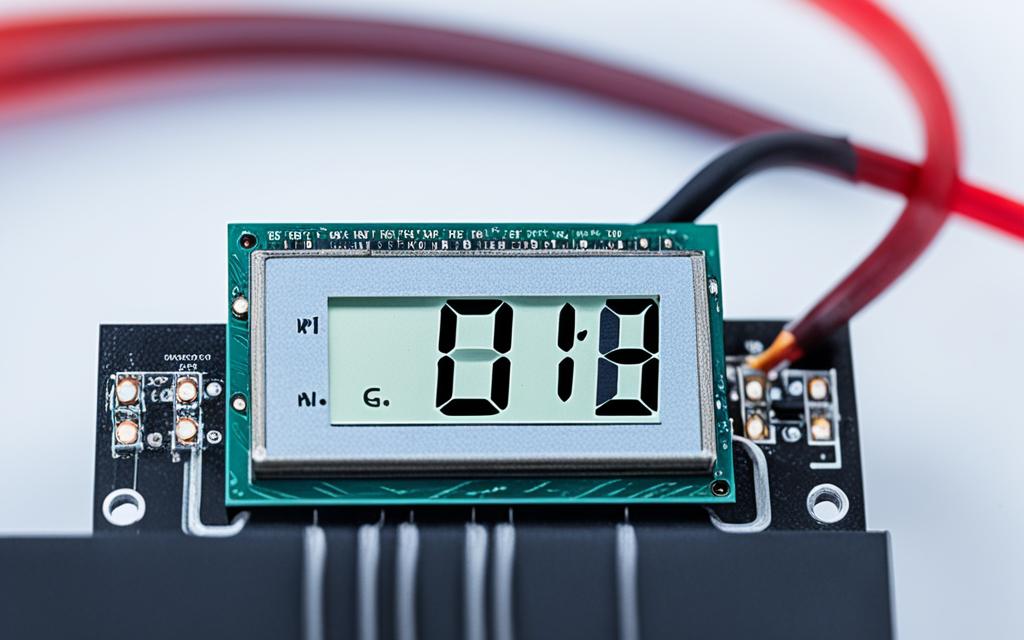Table of Contents
As we see tech evolve, knowing about CPU temperature becomes more vital. This is true for casual surfers and gamers alike. Many wonder if a 70°C safe operating temperature for CPUs is okay. It’s critical to think about how heat affects a processor’s working life and speed.
Running a CPU hotter than 70°C might slow it down or even damage it1. Knowing the best temperature range for your CPU is key. It helps keep your computer running smoothly. So, we’ll explore what happens when CPUs get too hot and what’s considered too hot.
Key Takeaways
- Optimal operating temperatures vary, but 70°C is often at the threshold for many modern CPUs.
- Understanding how different models handle heat can guide cooling decisions.
- Proper cooling solutions are vital to prevent performance issues and hardware damage.
- Regular monitoring of CPU temperature is essential for maintaining performance.
- Considering airflow and dust accumulation can enhance cooling efficiency.
Understanding CPU Temperature Ranges
Knowing how hot your CPU should be is key to keeping it working well for longer. CPU temperatures change a lot, depending on how you use your computer and the parts inside it. Keeping an eye on both idle and working temperatures of your CPU can help you avoid overheating. This also makes your computer run more smoothly.
What are Typical Idle and Load Temperatures?
On a normal day, CPUs stay between 30°C and 40°C (86°F to 104°F) when they’re not working hard. But when you play games or use big software, the temperature can jump to between 60°C and 85°C. For example, the Intel Core i5-12600K should not get hotter than 100°C. If it goes over 90°C, it might get damaged23. High-performance CPUs can handle heat up to a point, but over 70°C may cause problems3.
Factors Affecting CPU Temperatures
Many things can make your CPU hotter or cooler. Knowing them can help you find ways to keep the temperature down:
- Cooling solutions: Good coolers, like liquid or air ones, make a big difference.
- Case ventilation: You need good airflow in your computer case to get the hot air out.
- Ambient room temperature: If your room is hot, your CPU might be too.
- Component quality: How well your cooler and thermal paste work affects the heat.
Some computers, especially in places like data centres, often work at around 60°C2. If a CPU gets hotter than 80°C to 90°C, it’s getting too hot. And once it hits 80°C (176°F), it starts slowing down to avoid damage3.
| Temperature Range | Condition | Action Required |
|---|---|---|
| 30°C – 40°C | Idle | No action required |
| 60°C – 85°C | Load | Monitor performance |
| 70°C | Approaching danger zone | Consider cooling improvements |
| 90°C | Critical | Immediate cooling needed |
| 100°C | Maximum threshold | Prevent damage, shut down |
Is 70 Celsius Hot for CPU?
To know if 70°C is too hot for a CPU, we need advice from the pros and comparisons of different CPUs. Overheating is a worry when the temperature goes up, especially during hard tasks. Most experts say it’s important to keep CPU temperatures safe for good performance and long life.
Expert Opinions on Safe Operating Temperatures
Experts agree that it’s best to keep CPU temperatures under 80°C when doing heavy tasks to avoid damage and performance issues. A safe and normal CPU temperature is between 30°C and 40°C when idle. When under heavy use, it’s between 60°C and 70°C4. So, a CPU at 70°C is just about at the safe limit for tough jobs like gaming or video editing.
Comparative Analysis of Different CPU Models
Looking at different CPU models, AMD Ryzen processors can handle a bit more heat than Intel’s. Intel CPUs do best under 80°C, but AMD’s can go up to 90°C for a short time without harm4. This shows why knowing your CPU’s thermal design power is crucial when worrying about overheating. Using good cooling methods and keeping air moving can help keep the temperature down.
Consequences of High CPU Temperatures
When a CPU gets too hot, several negative outcomes can affect your computer use. High temperatures lead to thermal throttling. This is where a CPU performance drop happens because the processor slows down to cool off. This action can slow down your work, especially if you need lots of processing power.
Impact on Performance and Efficiency
Modern processors work well up to 80°C (176°F). But going over this can cause big problems. If the CPU gets hotter than 80°C, it’s more likely to perform poorly and might even stop working if it stays too hot for too long4. When processors overheat, they can’t work as well as they should. People doing demanding tasks like gaming or creating content will see their efficiency drop as the CPU gets hotter4.
Potential Damage and Longevity Concerns
If a CPU keeps running at high temperatures, it can harm the inside parts, affecting how long the CPU will last. Although CPUs can handle heat for short times, too much heat is dangerous and can cause parts to fail4. Watch out for signs of overheating, like sudden power offs and slow performance. To help your CPU last longer, make sure it stays cool and check its temperature often4.
| Temperature Range (°C) | CPU Performance | Longevity Risk |
|---|---|---|
| 30-40 | Optimal Performance | Low Risk |
| 60-70 | Normal Performance | Moderate Risk |
| 70-80 | Potential Performance Drop | Increased Risk |
| Above 80 | Significant Performance Issues | High Risk of Damage |
By knowing and acting on information about CPU temperatures, you can keep your system running well and make your CPU last longer.
Effective Cooling Solutions for CPUs
To effectively manage CPU temperatures, it’s crucial to understand the different cooling solutions available. As CPUs handle intensive tasks, using the right CPU cooling solutions is key. This helps keep the system running smoothly for longer.
Upgrading Stock Coolers and Thermal Paste
One top way to better cool your CPU is to upgrade cooler units. You should also use top-quality thermal paste. Stock coolers often can’t handle intense work, which makes CPU temperatures go up a lot. Aftermarket coolers, like advanced air and liquid ones, work much better. They significantly cut down on temperature. Also, using good thermal paste helps transfer heat better from the CPU to the heatsink. This aids in efficient cooling.
The Role of Power Supply Unit (PSU) on CPU Heat
The influence of the PSU on CPU temperature is huge. A good power supply unit helps keep the system stable. Units with higher wattage spread out power more evenly. If a PSU is too weak or inefficient, it can get too hot. This heat can make the CPU run worse. Keeping air moving around the PSU is important. Bad airflow makes overheating problems worse. So, it’s important to keep vents clean and make sure nothing blocks the air.
| Cooler Type | Cooling Efficiency | Recommended Usage |
|---|---|---|
| Stock Air Cooler | Basic | Low to moderate workloads |
| Aftermarket Air Cooler | Moderate to High | Gaming, heavy tasks |
| Liquid Cooler | High | Extreme gaming, overclocking |
Overall, better cooling methods like upgrading coolers and choosing the right PSU are crucial. They help control CPU temperatures well. A system that’s well-balanced ensures it performs at its best. It also lasts longer with less risk of getting too hot567.
Monitoring CPU Temperatures
Watching your CPU’s temperature is key to keeping your system running well. Too much heat can damage your computer’s parts. By using the right tools, you can watch over your CPU’s heat and stop it from getting too hot.
Tools and Software for CPU Temperature Management
There are lots of CPU temperature monitoring tools, like Core Temp, HWMonitor, and MSI Afterburner. These software for CPU management tools give you live updates. This can help you spot temperature problems quickly. Ideally, your CPU should stay below 80°C for the best performance. Going over this can stress your hardware, especially if it gets past 85°C8.
It’s vital to use monitoring software to avoid dangerous CPU temperatures during heavy computer use. For instance, while gaming or streaming. Research shows CPU temperatures can vary between 65 and 72°C when you’re watching Twitch or on Discord calls9.
When to Seek Help or Take Action
If your CPU’s heat often goes over safe levels, you may need to get help. Ignoring this can cause your system to perform poorly or even get permanent damage. If temperatures often top 80°C during normal use, there could be serious problems. Keeping an eye on your system’s heat is crucial for its health.
In situations of constant high heat, getting a professional check-up is smart. While tools give important details, taking steps to reduce heat is necessary. Cooling down your hardware can greatly extend its life and performance.
Conclusion
Keeping CPU temperatures under 70°C is key for the best performance and a longer life. We’ve seen that knowing the ideal temperature ranges is crucial for the safety of your CPU. If the temperatures go above these ranges, especially during heavy gaming or tasks, they can reach over 80°C. This could cause overheating and even permanent damage.
To manage temperature, having efficient cooling is important. This includes upgrading thermal paste and making sure your setup has good airflow. Checking temperatures regularly with tools like HWMonitor and Core Temp is also helpful. For more advice on keeping your CPU healthy, check out this resource. It has extra tips and recommendations.
Being proactive about preventing overheating is vital. By closely monitoring and using effective cooling methods, you can keep your CPU working well. This protects your computing for the future. Putting these actions first will improve performance and extend the life of your system101112.
FAQ
What is considered a safe operating temperature for a CPU?
Experts say keep CPU temperatures under 80°C when it’s working hard. This helps it perform well and last longer.
What are the typical idle temperatures for CPUs?
CPU idle temperatures usually sit between 30°C and 40°C. Different models and cooling methods can change this.
What factors affect CPU temperatures?
Many things can change a CPU’s temperature. These include the cooling system, how well the case lets air through, the room’s temperature, and the quality of the CPU’s parts.
Is 70°C too hot for a CPU during gaming?
70°C is a bit high but still safe for lots of CPUs, like the Intel i5-3470. This is especially true when playing games that need a lot of power.
What are the consequences of high CPU temperatures?
When CPUs get too hot, they slow down to cool off. This can make your computer perform worse. Over time, it might even damage the CPU.
How can I reduce my CPU’s temperature?
Better coolers and high-quality thermal paste can make a big difference. Aftermarket cooling solutions are also a good idea to keep temperatures down.
What role does the Power Supply Unit (PSU) play in managing CPU heat?
A good PSU supplies steady power and can help keep temperatures low. Power units with more wattage can make your system work more efficiently.
What tools can I use to monitor CPU temperatures?
Tools like Core Temp, HWMonitor, and MSI Afterburner give you live temperature readings. They help you keep an eye on how hot your CPU gets.
When should I seek help for overheating issues?
If your CPU’s temperature stays too high or if your PC starts having problems because of the heat, it’s wise to get professional help.
Source Links
- https://rog-forum.asus.com/t5/amd-500-400-series/pch-temperature-up-to-70-c/td-p/629262 – PCH Temperature up to 70°C
- https://community.spiceworks.com/t/what-is-a-normal-temperature-for-a-cpu-and-how-do-i-keep-it-low/948818 – What is a normal temperature for a CPU and how do I keep it low?
- https://websitebuilder.org/blog/what-is-a-good-cpu-temp/ – What Is A Good CPU Temp?
- https://www.noyafa.com/blogs/knowledge-base/good-cpu-temperature – What Is A Good CPU Temperature? A Guide to Keep Your Processor Cool
- https://www.crucial.com/support/system-maintenance-cooling – How to cool down your PC or Laptop
- https://ms.codes/blogs/computer-hardware/is-70-degrees-hot-for-a-cpu – Is 70 Degrees Hot For A CPU
- https://rockymtnruby.com/what-cpu-temperature-is-considered-safe/ – What CPU Temperature is Considered Safe? – Rocky MTN Ruby
- https://forums.tomshardware.com/threads/cpu-temp-70°-75°c-while-gaming.3590243/ – [SOLVED] – CPU Temp 70°-75°c while gaming
- https://forums.linuxmint.com/viewtopic.php?t=401254 – High CPU temperature on laptop when doing simple tasks
- https://directmacro.com/blog/post/what-is-optimal-cpu-and-gpu-temp – What Is Optimal GPU Temp and CPU Temperature Range
- https://blenderartists.org/t/worry-about-gpu-working-temperature/1482920 – Worry about GPU working temperature
- https://www.pugetsystems.com/labs/articles/impact-of-temperature-on-intel-cpu-performance-606/ – Impact of Temperature on Intel CPU Performance








